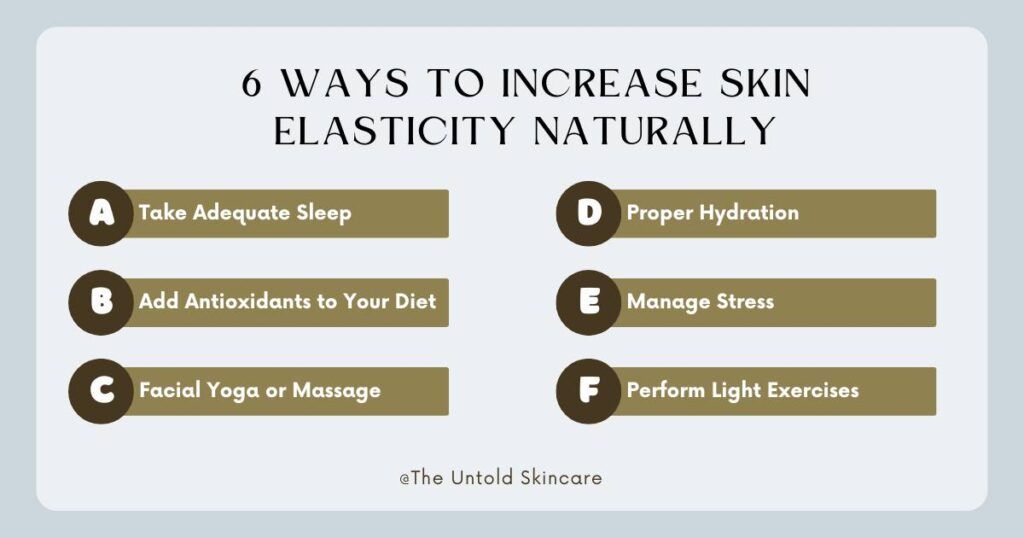Are you tired of looking in the mirror and seeing saggy skin?
As a key component of healthy and vibrant skin, elasticity plays a crucial role in maintaining firmness and warding off the signs of aging.
As we age, our skin naturally loses its elasticity, leading to wrinkles, fine lines, and a lack of firmness.
So the question here is: How to increase elasticity in skin naturally?
In this blog post, you are going to learn everything about skin elasticity and how you can boost your skin elasticity in a few simple ways.
What Exactly is Skin Elasticity?
Skin elasticity is the skin’s natural ability to stretch and then return to its original form and structure.
The presence of collagen and elastin fibers inside the dermal layers of the skin is principally responsible for this vital characteristic. Collagen offers structural support to the skin, whereas elastin permits it to return to its original shape after being stretched or crushed.
Consider skin elasticity to be the body’s natural “snapback” mechanism, which keeps the skin tight, taut, and free of sagging.
The Key To Skin Elasticity
The loss of skin elasticity is driven by a decline in the production of two vital proteins: collagen and elastin.
Collagen serves as the structural foundation of the skin, providing strength and support, while elastin allows the skin to stretch and return to its original form.
Collagen fibers lose their density, resulting in a reduction of skin firmness and resilience. Simultaneously, the decrease in elastin production hampers the skin’s ability to recoil after being stretched, contributing to sagging and the formation of wrinkles.
When the synthesis of collagen and elastin diminishes, the skin starts losing its natural elasticity. So, the key thing is to boost the production of collagen and elastin to increase skin elasticity naturally.
What Causes Reduction in Skin Elasticity?
The reduction in skin elasticity stems from a combination of intrinsic and extrinsic factors, with aging being a primary contributor. As we age, the natural decline in collagen and elastin production diminishes the skin’s ability to maintain firmness and elasticity.
Besides aging, the biggest factors that contribute to the loss of skin elasticity are UV damage, sleep deprivation, rapid weight loss, smoking, and genes. Environmental factors, including pollutants, also contribute to the breakdown of skin elasticity.
6 Simple Ways to Increase Elasticity in Skin Naturally

Take Adequate Sleep

Adequate and quality sleep is often underestimated in its impact on skin health. During the restorative phases of sleep, the body engages in essential processes that directly benefit the skin. Collagen production, a key factor in maintaining skin firmness, is stimulated during deep sleep.
When we are sleep-deprived, our bodies produce more cortisol, a stress hormone that can break down collagen and elastin in the skin, leading to sagging and wrinkles
Improved blood flow to the skin, heightened cellular repair mechanisms, and the elimination of toxins all occur during the sleep cycle, collectively supporting the skin’s vitality and elasticity.
Aim for 7-9 hours of quality sleep each night to give your skin the rest it needs to rejuvenate.
Add Antioxidants to Your Diet

Antioxidants play a crucial role in enhancing skin elasticity by neutralizing free radicals and protecting the skin from oxidative stress.
Free radicals, generated by environmental factors like UV radiation and pollution, contribute to the breakdown of collagen and elastin, leading to a loss of skin elasticity. Antioxidants, found in various fruits, vegetables, and skincare products, act as defenders against these damaging free radicals.
Vitamins C and E, in particular, are potent antioxidants that promote collagen synthesis, preventing premature aging and supporting skin firmness.
Facial Yoga or Massage

Facial yoga and massage techniques offer a holistic approach to enhancing skin elasticity by addressing various aspects of skin health.
Through improved blood circulation, facial yoga stimulates oxygen and nutrient delivery to the skin, supporting its natural regenerative processes.
Engaging in specific exercises tones facial muscles, promoting lift and firmness. These practices also help to stimulate collagen production, a key factor in maintaining skin elasticity. By releasing tension and stress, facial massage prevents the formation of fine lines and wrinkles, contributing to a smoother and more resilient complexion.
So, start doing facial massage like forehead stretch, lymphatic drainage massage, or acupressure massage regularly.
Related Post: Facial Exercises for Skin Health: Everything You Need to Know
Proper Hydration

Proper hydration is crucial for maintaining skin elasticity as it directly impacts the skin’s structural integrity and overall health. When your body is properly hydrated, it ensures that your skin cells receive the necessary nutrients and stay plump and moisturized.
By increasing your water intake, you promote the production of elastin in your skin. Well-hydrated skin is less prone to dryness and flakiness, which can contribute to the appearance of fine lines and wrinkles.
Additionally, proper hydration promotes better blood circulation, which is essential for maintaining healthy and radiant skin. It helps flush out toxins and deliver essential nutrients to your skin cells, ensuring they function optimally.
So, drink about 4 liters of water daily for adequate hydration.
Manage Stress

Managing stress is integral to maintaining and improving skin elasticity, as chronic stress can have detrimental effects on the skin’s health and appearance.
High stress levels trigger the release of cortisol, a hormone that, when elevated over an extended period, can lead to the breakdown of collagen and elastin fibers in the skin. This process contributes to a loss of firmness and resilience, leading to sagging and wrinkles.
Additionally, stress can impair the skin’s ability to repair itself and reduce its capacity to retain moisture, resulting in a dull and dehydrated complexion.
Find stress-management techniques that work for you, such as practicing mindfulness, deep breathing exercises, or engaging in hobbies that bring you joy.
Related Post: Stress Effects on Skin: Why it Could be The Biggest Culprit?
Perform Light Exercises Regularly

Regular exercise is not only essential for maintaining a healthy weight and overall well-being but also plays a significant role in improving skin elasticity. When you engage in physical activity, your blood circulation increases, delivering essential nutrients and oxygen to your skin cells.
Regular exercise can improve face elasticity by toning the underlying muscles. It can help strengthen the muscles that support your skin.
Aim for at least 20-30 minutes of moderately intense exercise and remember to stay consistent.
Related Post: Best Exercises for Glowing Skin
Foods That Increase Skin Elasticity
Vitamin C, Vitamin E, and Omega-3 Fatty acids are three crucial nutrients for skin elasticity.
Start by including vitamin C-rich foods such as citrus fruits like oranges, strawberries, and kiwi, as well as bell peppers and broccoli. These fruits and vegetables not only enhance collagen synthesis but also protect the skin from oxidative stress.
For vitamin E, incorporate nuts like almonds and sunflower seeds, along with spinach and sunflower oil, into your daily meals. These vitamin E-rich foods act as a protective shield against the breakdown of collagen and elastin fibers, crucial for skin elasticity.
Additionally, for omega-3 fatty acids, consider adding fatty fish such as salmon and mackerel, flaxseeds, chia seeds, and walnuts to your diet.
Tips to Prevent Loss of Skin Elasticity
Protect Your Skin from the Sun:
UV rays accelerate the breakdown of collagen and elastin fibers, leading to loss of skin elasticity. Use sunscreen with a high SPF, wear protective clothing, and avoid prolonged sun exposure, especially during peak hours.
Avoid Smoking:
Smoking accelerates the aging process and damages collagen and elastin fibers. Quitting smoking can contribute to improved skin elasticity over time.
Limit Alcohol Consumption:
Excessive alcohol consumption can dehydrate the skin, leading to loss of elasticity. Consume alcohol in moderation and balance it with ample water intake or avoid it.
Moisturize:
Use a good-quality moisturizer to keep the skin hydrated and prevent dryness. Well-moisturized skin is more supple and less prone to sagging.
For Quick Result…
One thing that I highly recommend if you want quick results is to consume oral collagen supplements.
This method is becoming extremely popular nowadays and is also claimed to possess anti-aging properties. Also, several studies have proven it right.
It has been studied that the daily intake of about 5 gm of oral Collagen hydrolysates can bring significant improvement in skin elasticity, especially in sun-exposed areas. Typical collagen hydrolysates are made up of peptides of varying lengths and have a unique amino acid makeup depending on the collagen source.
One study found that taking a liquid nutraceutical including hydrolyzed fish collagen, antioxidants, vitamins and other active components on a regular basis could enhance skin smoothness and elasticity by over 40%.
Read The Research Journal Here
Few Natural Treatments
Avocado Mask:
Mash up half an avocado, apply it on your face, and let the magic happen. The natural oils and nutrients will do wonders for your skin’s elasticity.
Raw Honey:
Raw honey is a natural humectant, meaning it helps retain and attract moisture to the skin, promoting hydration and suppleness. Apply a small amount of raw honey to your skin regularly.
Aloe Vera Gel:
Apply pure aloe vera gel to your skin. Aloe vera has soothing and hydrating properties that can enhance skin elasticity.
Coconut Oil:
Coconut oil is rich in fatty acids that can moisturize the skin and improve its elasticity. Apply a small amount to your skin regularly.
Also Read: How to Get Clear Skin? 20 Tips That Include Everything
Frequently Asked Questions:
1. Can genetics affect skin elasticity?
Absolutely! Genetics plays a role in determining your skin’s natural elasticity. However, adopting a healthy lifestyle can still make a significant difference.
2. How soon can I expect to see results?
Patience is key! While some changes may be noticeable in a few weeks, long-term commitment is crucial for lasting results.
3. Are there specific foods I should avoid for better skin elasticity?
Cutting back on sugar and processed foods is a good start. These can contribute to inflammation, which may impact your skin’s elasticity.






One thought on “How to Increase Elasticity in Skin Naturally? 6 Simple Ways”